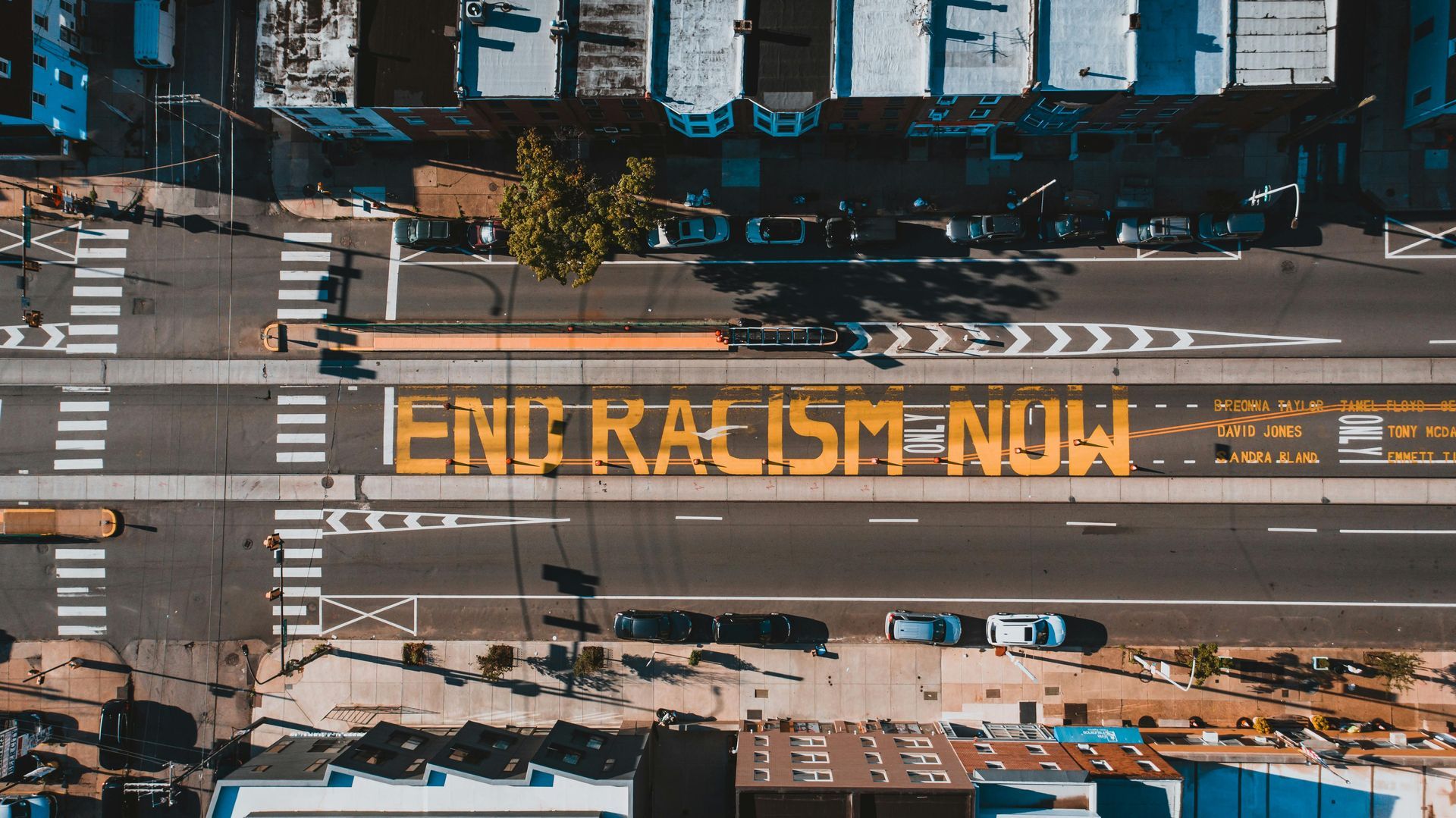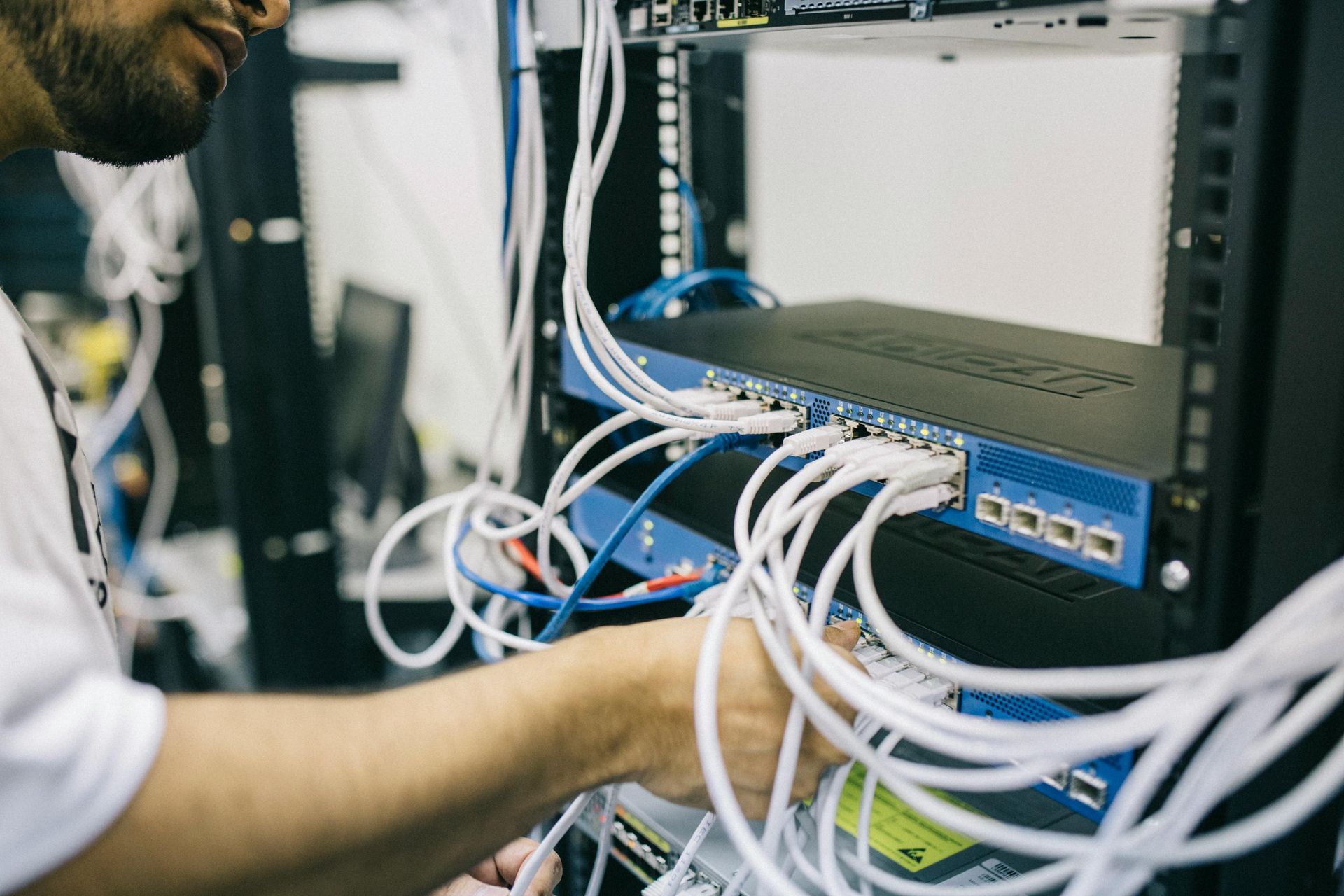AI, Automation, and the Future of Black Employment: A Crisis in the Making?
Dr. Kai Dupe • March 1, 2025
Artificial intelligence (AI) is transforming industries at an unprecedented pace, and while it promises efficiency and innovation, it also threatens millions of jobs.

Artificial intelligence (AI) is transforming industries at an unprecedented pace, and while it promises efficiency and innovation, it also threatens millions of jobs. A recent report estimates that 4.5 million jobs held by African Americans are at risk of automation-driven displacement. Black workers are 10% more likely to be affected by AI-related job loss than other groups. This is not just a technological shift—it’s a social and economic crisis in the making.
Why Are Black Workers More Vulnerable?
The impact of AI on employment isn’t uniform across all demographics. Black workers are disproportionately represented in roles that are highly susceptible to automation, such as administrative support, retail, food service, and transportation. As AI-powered systems take over customer service, logistics, and clerical tasks, many of these jobs will vanish.
Compounding the issue is underrepresentation in high-growth tech fields
like software engineering, AI development, and data science—industries that will see job expansion, not contraction. Structural barriers
such as limited access to STEM education, biases in hiring, and fewer reskilling opportunities mean that Black workers are often left out of the digital economy’s most lucrative opportunities.
How Can We Prepare for an AI-Driven Future?
1. Workforce Reskilling and Training
To prevent mass displacement, we need targeted workforce development programs
that provide Black professionals with AI-resistant skills. HBCUs, community colleges, and industry partnerships
must offer accessible training in data analytics, AI ethics, cybersecurity, and software development.
2. Inclusive AI Development
It’s not enough for Black workers to merely adapt to AI—we need to shape AI
itself. Increasing Black representation in AI research, policy, and development ensures that these technologies serve diverse communities equitably rather than reinforcing biases.
3. Corporate and Policy Interventions
Tech companies must be held accountable for equitable hiring and upskilling policies, while government initiatives should fund programs that support Black entrepreneurs and tech professionals. If left unchecked, AI could widen the racial wealth gap
instead of closing it.
The Time to Act Is Now
AI is here to stay, but its impact on Black employment is not inevitable. By investing in education, advocacy, and policy changes, we can create an AI-powered future that includes—not excludes—Black workers. The question is: Will we act now, or wait until it’s too late?

By Dr. Kai Dupe
•
March 24, 2025
As we honor Women’s History Month, I find myself reflecting on the legacy of Dorothy Vaughan — a quiet pioneer whose story speaks volumes about resilience, leadership, and the power of staying ready for change. Dorothy Vaughan was one of the Black women mathematicians who worked as human “computers” at NASA’s predecessor, the National Advisory Committee for Aeronautics (NACA), starting in the 1940s. In an era of segregation, she worked in the West Area Computing Unit at Langley Research Center in Virginia, a separate section for Black women doing advanced mathematical calculations critical to aeronautics research. In 1949, she became NASA’s first African American female supervisor. But her most lasting contribution may be her foresight. As NASA began transitioning from human computers to electronic computers, Vaughan taught herself the programming language FORTRAN — and then taught it to the women on her team. Her leadership ensured they would not be left behind by the very technology they helped shape. Dorothy Vaughan’s story, popularized through the book and film Hidden Figures, is more than a tale of individual achievement. It’s a reminder of how many contributions by women — especially Black women — have gone unrecognized in science and technology. Her ability to see what was coming, to adapt, and to uplift others while doing so, resonates deeply with today’s conversations around diversity, equity, and inclusion. In a tech world still grappling with underrepresentation and bias, Vaughan’s example is instructive. She didn’t wait for an invitation to learn or to lead. She prepared herself and created pathways for others. Her story challenges all of us — educators, technologists, and leaders — to make sure the systems we build don’t overlook the talent that doesn’t always show up where we expect it. As an African American programmer, I see myself in Dorothy Vaughan’s journey. Her brilliance and determination remind me that we come from a lineage of innovators who didn’t just use technology — they shaped it. Her legacy inspires me to keep learning, keep teaching, and keep opening doors for those who come after.

By Dr. Kai Dupe
•
March 12, 2025
Pioneering Web Animation: The Birth of Shockwave One of Gelobter’s most impactful contributions was her work on Shockwave, a technology that revolutionized web animation and interactivity in the 1990s. Shockwave was an early internet multimedia platform that played a crucial role in the development of rich online experiences, from animated web content to interactive games. Before technologies like HTML5 and modern video codecs, Shockwave allowed developers to create engaging, dynamic websites when the internet was still in its infancy. Her work on Shockwave paved the way for early GIF animation technology, which remains a staple of internet culture today. Every time you see an animated GIF in a meme or a social media post, you’re seeing the legacy of the multimedia frameworks she helped develop. Shaping the Future of Online Video Streaming Beyond web animation, Gelobter also made significant contributions to video streaming technology. She played a key role in developing the infrastructure behind Hulu, one of the first major streaming platforms that brought television and movies to the internet. At a time when streaming was still a novel concept, Gelobter’s expertise in software engineering helped optimize video delivery, making online streaming more efficient and accessible. Today, streaming services like Netflix, Disney+, and Amazon Prime Video owe much of their success to the foundational technology developed by early innovators like her. A Trailblazer in Tech and Diversity Advocacy Lisa Gelobter’s contributions extend beyond just technology. As a Black woman in tech, she has been a vocal advocate for diversity in computing. She has worked in leadership roles, including serving as the Chief Digital Service Officer for the U.S. Department of Education during the Obama administration. Additionally, she founded tEQuitable, a platform that leverages technology to foster inclusive and equitable workplaces. Her efforts continue to break barriers and create opportunities for underrepresented groups in STEM. Conclusion Lisa Gelobter’s work in multimedia, animation, and streaming technology has had a lasting impact on how we consume content online. From helping to pioneer web animation to developing early video streaming infrastructure, her technical contributions have shaped the digital experiences we take for granted today. As we celebrate the achievements of Black women in technology, Lisa Gelobter’s legacy stands as a testament to innovation, perseverance, and the power of diversity in computing.

By Dr. Kai Dupe
•
March 9, 2025
The Statue of Liberty, standing tall in New York Harbor, is universally recognized as a symbol of freedom and democracy. While many associate her with welcoming immigrants, a deeper look into her origins reveals a profound connection to the abolition of slavery in the United States. Origins Rooted in Abolition The inception of the Statue of Liberty traces back to Édouard René de Laboulaye , a French political thinker, professor, and ardent abolitionist. Laboulaye was a vocal supporter of the Union during the American Civil War and saw the end of slavery as a monumental step toward universal liberty. In 1865, he proposed the idea of a commemorative monument, not just to celebrate American independence, but specifically to honor the abolition of slavery. C ollaborating with sculptor Frédéric Auguste Bartholdi , Laboulaye envisioned a statue that would embody freedom breaking free from bondage. Early designs prominently featured Lady Liberty holding broken chains and shackles, symbolizing the end of slavery. However, to create a more universal symbol of liberty, Bartholdi later modified the design, placing the broken chains beneath her feet. The Hidden Symbolism at Her Feet Today, visitors to Liberty Island might overlook a subtle yet powerful detail: at the feet of the Statue of Liberty lie broken shackles and chains. These elements, partially obscured by her flowing robes, represent Liberty breaking free from oppression and tyranny, directly alluding to the abolition of slavery. This imagery serves as a poignant reminder that the struggle for freedom is intertwined with the fight against slavery. The broken chains at her feet underscore the triumph over bondage and the enduring pursuit of human rights. Evolution of Symbolism While the statue's original intent was to celebrate emancipation, over time, its symbolism expanded. By the early 20th century, as waves of immigrants arrived in the United States, the Statue of Liberty became a beacon of hope and a welcoming figure for those seeking a new life. The addition of Emma Lazarus's poem, "The New Colossus," inscribed on a plaque in 1903, further cemented this association. Phrases like "Give me your tired, your poor, your huddled masses yearning to breathe free" shifted the narrative towards immigration. However, it's crucial to acknowledge and remember the statue's original symbolism. The broken chains at her feet are not merely artistic details; they are emblematic of a nation's journey from slavery to freedom. Recognizing this aspect adds depth to our understanding of the monument and honors the legacy of those who fought for abolition. Conclusion The Statue of Liberty stands as a multifaceted symbol, embodying the ideals of freedom, democracy, and hope. Beyond her association with welcoming immigrants, her very foundation is rooted in the celebration of emancipation and the end of slavery. The broken chains at her feet serve as a testament to this legacy, reminding us of the enduring struggle for liberty and justice for all.

By Dr. Kai Dupe
•
February 17, 2025
Throughout American history, racism has been deeply embedded in the nation's political institutions, and many U.S. presidents have contributed to, upheld, or reinforced racist policies. While some presidents are widely celebrated for their leadership, their records often include actions and statements that disproportionately harmed racial minorities. Founding Fathers and Slavery Many early U.S. presidents were enslavers, profiting from the forced labor of Black Americans. George Washington owned over 100 enslaved people and signed the Fugitive Slave Act of 1793, which allowed for the capture and return of escaped enslaved individuals. Thomas Jefferson, who wrote "all men are created equal," enslaved over 600 people and stated in Notes on the State of Virginia that Black people were "inferior" in reason and imagination. Andrew Jackson expanded slavery into new territories and was responsible for the Indian Removal Act (1830), which led to the Trail of Tears, a forced march that killed thousands of Native Americans. Racism in Federal Policy Some presidents institutionalized racism through policies that actively discriminated against racial minorities. Woodrow Wilson segregated federal offices and screened The Birth of a Nation, a film glorifying the Ku Klux Klan, in the White House. Franklin D. Roosevelt ordered the internment of over 120,000 Japanese Americans during World War II, citing national security concerns but ignoring the blatant racial discrimination behind the policy. Lyndon B. Johnson, despite signing civil rights legislation, was known for using racial slurs and reportedly opposed certain provisions of the Civil Rights Act of 1964. Modern-Era Presidents and Systemic Racism Even in recent history, presidents have upheld policies disproportionately targeting racial minorities. Richard Nixon's "War on Drugs" was later revealed by his adviser John Ehrlichman to have been designed to target Black Americans and anti-war activists. Ronald Reagan continued the War on Drugs, disproportionately incarcerating Black and Latino Americans, and opposed economic sanctions against apartheid South Africa. Bill Clinton's 1994 Crime Bill contributed to mass incarceration, leading to a significant increase in prison populations, disproportionately affecting Black Americans. Conclusion While some U.S. presidents have taken steps toward racial justice, history shows that many have engaged in policies and rhetoric that upheld racism. Recognizing this past is essential for understanding how systemic racism continues to shape America today.

By Dr. Kai Dupe
•
February 5, 2025
When we think about the pioneers of computing, names like Alan Turing, Steve Jobs, and Bill Gates often dominate the conversation. However, Black innovators have played a crucial role in shaping the technological landscape, making groundbreaking contributions to computer science, artificial intelligence, and cybersecurity. Their stories deserve recognition, not only for historical accuracy but also to inspire future generations of Black technologists. Early Black Pioneers in Computing Roy Clay Sr.: The Godfather of Silicon Valley Often referred to as the "Godfather of Silicon Valley," Roy Clay Sr. was instrumental in developing HP's first computer in the 1960s. He led HP’s software development division and championed diversity in tech, opening doors for future generations of Black engineers. Evelyn Boyd Granville: NASA's Computing Visionary. Evelyn Boyd Granville was one of the first Black women to earn a Ph.D. in Mathematics (Yale, 1949). She worked on early NASA missions, using computing to calculate orbital mechanics, which was vital for space travel. Clarence "Skip" Ellis: A Trailblazer in Collaborative Computing The first African American to earn a Ph.D. in Computer Science (University of Illinois, 1969), Ellis pioneered work in groupware and collaborative computing. His contributions laid the foundation for modern-day collaborative tools used in offices worldwide. Innovators in Computer Programming & Software Development Mark Dean: Revolutionizing the Personal Computer Mark Dean co-invented the IBM Personal Computer (PC) and holds three of the nine original patents for it. His work led to advancements in color PC monitors and the ISA bus, allowing multiple devices to connect to computers seamlessly. Valerie Thomas: Advancing 3D Imaging A NASA scientist, Valerie Thomas developed 3D imaging technology that influenced modern medical imaging and computer graphics, proving that Black women have been shaping tech innovation for decades. Black Leaders in AI & Cybersecurity Timnit Gebru: Ethical AI Researcher Timnit Gebru is known for her pioneering research on ethical AI, particularly in addressing racial bias in machine learning models. Her work is shaping the future of fair AI applications. Ayanna Howard: Robotics & AI Advocate Ayanna Howard developed intelligent robotic systems for NASA and continues to push the boundaries of AI accessibility and inclusivity. Black Contributions to Internet & Cybersecurity Lisa Gelobter: Internet Streaming Innovator Lisa Gelobter helped develop Shockwave, an early technology that led to web animation and streaming media platforms like Hulu. Emmit McHenry: DNS Pioneer Emmit McHenry created the technology behind domain name systems (DNS), which is critical to how the modern internet functions. Closing Thoughts Black pioneers have left an undeniable mark on computing history. By recognizing and celebrating their achievements, we not only honor their legacies but also inspire the next wave of Black innovators to shape the future of technology.

By Dr. Kai Dupe
•
January 29, 2025
The tech industry has long faced scrutiny for its lack of diversity, and evidence shows that racism—both overt and systemic—continues to play a role in hiring practices, hindering progress toward equity and inclusion. From implicit biases to discriminatory policies, these practices disproportionately impact Black, Latinx, and Indigenous individuals seeking opportunities in tech. The Evidence of Racism in Hiring Numerous studies highlight how racial bias influences hiring decisions. Resume studies, for instance, reveal that candidates with “ethnic-sounding” names receive fewer callbacks than those with “white-sounding” names, even when qualifications are identical. A landmark study by Bertrand and Mullainathan found that resumes with names like “Emily” or “Greg” were 50% more likely to receive callbacks than those with names like “Lakisha” or “Jamal.” This bias underscores a systemic disadvantage for underrepresented groups. Hiring practices often reinforce homogeneity within tech companies. Employee referral programs, a common recruitment method, favor candidates within existing networks, which tend to lack diversity. Additionally, technical assessments and culturally biased interview questions can disadvantage candidates from marginalized communities. The emphasis on degrees from elite institutions further exacerbates disparities, as these schools often enroll fewer Black and Latinx students . Disparities Extend Beyond Hiring Racism doesn’t stop at the hiring stage. Pay inequity and limited access to promotions are persistent issues for Black and Latinx employees in tech. Whistleblower reports and lawsuits have brought attention to discriminatory practices, including allegations against major tech companies like Facebook, which was sued in 2020 for favoring temporary visa holders over U.S. workers. Addressing the Problem Some tech companies have taken steps to mitigate racism in hiring. Initiatives like blind resume reviews aim to reduce name-based bias, while structured interviews help standardize evaluation criteria. Partnerships with organizations like Code2040, AfroTech, and Blacks in Technology are helping companies tap into underrepresented talent pools. Implicit bias training for hiring managers is also becoming more common. However, these efforts must go further. Tackling systemic racism requires not just incremental changes but a reevaluation of hiring practices, workplace culture, and access to opportunities. Companies must actively invest in creating equitable pathways to leadership and foster an inclusive environment that enables diverse talent to thrive. If tech is to fulfill its promise of innovation, it must first address the inequalities baked into its systems. Diversity isn’t just a moral imperative—it’s a business necessity.

By Dr. Kai Dupe
•
January 22, 2025
While Dr. Martin Luther King Jr. is not typically associated with technology or directly addressing the technology divide, his work on economic justice, education, and systemic inequality laid a critical foundation for addressing disparities in access to technology for Black communities. His advocacy for equity, opportunity, and empowerment resonates with the ongoing efforts to close the technology divide. 1. Economic Justice and the Poor People's Campaign In 1968, Dr. King launched the Poor People's Campaign, focusing on economic inequality and advocating for systemic changes to uplift marginalized communities. Though not directly tied to technology, the campaign emphasized access to resources, infrastructure, and opportunities, which are critical for closing the digital divide. The campaign's goals align with the modern fight for equitable access to technology, which is essential for economic participation today. Relevance to Technology : The digital divide is often rooted in economic inequality. King’s call for fair wages, employment opportunities, and economic empowerment intersects with modern efforts to ensure access to digital tools and resources for underserved communities. 2. Advocacy for Education Dr. King emphasized the importance of education as a means to empower Black Americans and dismantle systemic oppression. In his famous 1947 essay, The Purpose of Education, King wrote about education’s role in developing critical thinking and character . Relevance to Technology : Today, access to educational technology is a cornerstone of quality education. King’s belief in the transformative power of education supports the notion that all students, regardless of race or socioeconomic status, deserve access to the tools and resources necessary to succeed in a digital world. 3. Call for Systemic Change King understood that systemic inequities required structural changes. His work pushed for policy reforms that addressed the root causes of racial and economic injustice. Relevance to Technology : Systemic inequities in technology access—such as underfunded schools in Black neighborhoods lacking computers or broadband—mirror the broader structural issues King fought against. Addressing these gaps requires the same kind of systemic advocacy King championed. Modern Connection: King's Legacy in Tech Advocacy While King himself did not work directly on technology issues, his legacy inspires movements like: The Black Tech Movement: Advocates for representation and inclusion of Black professionals in tech. Efforts to Close the Digital Divide: Programs like the Federal Communications Commission’s (FCC) Lifeline Program and initiatives like Black Girls Code reflect King's vision of equality by providing access to technology and education. Dr. King’s dream of justice and equality continues to inform efforts to ensure that technology serves as a tool for empowerment rather than a source of division.

By Dr. Kai Dupe
•
January 13, 2025
Recent decisions by major corporations to scale back Diversity, Equity, and Inclusion (DEI) initiatives could significantly impact efforts to increase African American representation in technology. As an industry that has long struggled with diversity, DEI programs have played a critical role in addressing systemic barriers and fostering inclusion. The reduction of these initiatives raises concerns about the progress toward equity in tech and beyond. One immediate challenge is the potential loss of targeted support for African Americans entering and advancing in tech. Many DEI initiatives include pipeline programs such as internships, scholarships, and partnerships with organizations like Black Girls Code or HBCUs. These efforts help African Americans access opportunities in tech, build skills, and create professional networks. Scaling back such programs risks shrinking this vital pipeline and undermining progress in diversifying the industry. Representation gaps are another concern. African Americans remain significantly underrepresented in leadership and technical roles in tech companies. Without deliberate DEI strategies, progress in hiring, retaining, and promoting African Americans may stagnate. This not only limits opportunities for individuals but also reduces the diversity of perspectives needed to foster innovation and create products that serve a broad audience. Furthermore, the reduction of DEI efforts could erode trust and morale among African American employees. It might signal that their inclusion is no longer a priority, discouraging engagement and retention. A less inclusive workplace environment can make it harder for African Americans to thrive and advance in their careers, further widening the gap. Despite these challenges, there are opportunities for communities and organizations to step up. Grassroots efforts led by groups like Code2040 and Afrotech can continue to support African Americans in tech, advocating for systemic change and creating alternative pathways for success. Strengthening partnerships with HBCUs and fostering mentorship programs can also help sustain the pipeline of diverse talent. Advocacy within companies, by employees and allies, can hold organizations accountable and push for inclusive practices, even in the absence of formal DEI initiatives. Ultimately, the tech industry’s ability to attract and retain African American talent depends on consistent investment and intentionality. While the scaling back of DEI initiatives is concerning, it also highlights the need for more sustainable and community-driven approaches. By combining grassroots action, institutional advocacy, and a commitment to diversity, we can ensure that African Americans continue to thrive in tech and contribute to a more inclusive and innovative industry. For those committed to equity, this moment serves as a call to action: to innovate, advocate, and push forward, even when institutional support wanes. The future of tech depends on it.

By Dr. Kai Dupe
•
January 8, 2025
Technology is often seen as neutral, but history shows it can reflect and amplify systemic biases. Black communities in the United States have faced harm from technologies designed or deployed in ways that reinforced discrimination. From surveillance to housing, these examples show how technological tools have been weaponized against marginalized groups. Surveillance and Policing Modern facial recognition technology has higher error rates when identifying Black faces, leading to false arrests. A 2019 study by the National Institute of Standards and Technology (NIST) found that African Americans were disproportionately misidentified. Historically, surveillance technology was weaponized through the FBI’s COINTELPRO program, which targeted Civil Rights leaders like Martin Luther King Jr., as documented by the National Archives . Redlining and Housing In the 1930s, the Homeowners’ Loan Corporation (HOLC) created redlining maps that systematically denied Black families access to home loans. This practice is detailed in a study by the University of Richmond’s Mapping Inequality project . Algorithmic redlining persists today. A 2020 report by the National Fair Housing Alliance revealed how digital platforms reinforce historical housing discrimination. Medical Exploitation The Tuskegee Syphilis Study (1932–1972) denied treatment to Black men with syphilis to study the disease. This unethical use of medical technology is well-documented in a Centers for Disease Control and Prevention (CDC) report . Similarly, the cells of Henrietta Lacks, taken without her consent, became foundational for medical advancements. Her story is explored in-depth by Johns Hopkins University. Education and Employment Black communities face unequal access to educational technology. A 2020 Pew Research study found that Black students were less likely to have reliable internet for remote learning. In hiring, algorithms replicate biases. A 2018 MIT study revealed that automated systems often penalized Black applicants. Environmental Racism Urban planning technologies displaced Black communities through mid-20th-century highway construction, such as Detroit’s Black Bottom neighborhood. This is detailed in the Federal Highway Administration’s repor t on highway history. Today, polluting industries disproportionately affect Black neighborhoods, as shown in a 2021 Environmental Protection Agency (EPA) study. Social Media and Misinformation Platforms like Facebook were exploited during the 2016 election to suppress Black voter turnout through targeted misinformation campaigns. This tactic is outlined in a 2018 Senate Intelligence Committee report . Moving Forward These examples reveal that technology is not neutral. It reflects societal values and power structures. Acknowledging this history is essential to creating technologies that serve all communities fairly. Equity, accountability, and inclusive design must be at the forefront of technological innovation.

By Dr. Kai Dupe
•
December 31, 2024
Nigerians have made remarkable contributions to the field of computing, showcasing ingenuity and innovation that have had both local and global impacts. From high-performance computing to cutting-edge app development, Nigerians continue to play a vital role in advancing technology. One of the most notable figures is Philip Emeagwali , who is celebrated for his pioneering work in high-performance computing. Emeagwali developed a formula for using thousands of processors to perform computations simultaneously, a concept foundational to parallel computing. His groundbreaking work contributed significantly to petroleum reservoir simulations, optimizing oil extraction processes. In 1989, he won the Gordon Bell Prize for his innovative use of parallel computing technology, cementing his legacy as one of Nigeria’s foremost technologists. Another influential figure is Chris Uwaje , often referred to as the "Father of Nigeria’s Internet." Uwaje was instrumental in establishing Nigeria’s National Information Technology Development Agency (NITDA), a body responsible for fostering IT growth and policy. He has long advocated for indigenous software development, emphasizing the importance of creating technology solutions tailored to Nigeria and Africa's unique needs. Ndubuisi Ekekwe has also made waves in the technology sector. A globally recognized technologist, he holds multiple patents and has made significant contributions to medical robotics and embedded systems. As the founder of the Tekedia Institute, Ekekwe is committed to empowering tech innovators across Africa through education and mentorship, promoting entrepreneurial growth in the tech sector. In the realm of software and app development, Chinedu Echeruo stands out. Echeruo founded HopStop, a transit app that gained widespread acclaim and was eventually acquired by Apple in 2013. His success highlights Nigeria’s growing influence in global tech entrepreneurship and innovation. Tom Ilube , a Nigerian-British technology entrepreneur, has also left an indelible mark. As a cybersecurity expert and founder of Crossword Cybersecurity, Ilube has been recognized internationally for his contributions. His inclusion as the most powerful man in Britain by the Powerlist in 2017 underscores the global impact of Nigerian talent. Nigerian organizations like Andela and Co-Creation Hub (CcHub) further demonstrate the country’s commitment to fostering technological innovation. Andela trains software engineers across Africa, while CcHub serves as an incubator for tech startups in Lagos, solidifying Nigeria’s position as a hub for tech talent and entrepreneurship. These individuals and initiatives showcase the immense contributions Nigerians have made to computing technology, shaping the future of innovation both at home and abroad. As Nigeria continues to nurture its tech ecosystem, its impact on the global stage will undoubtedly grow.
© 2025
All Rights Reserved | Dr. Kai Dupé.
